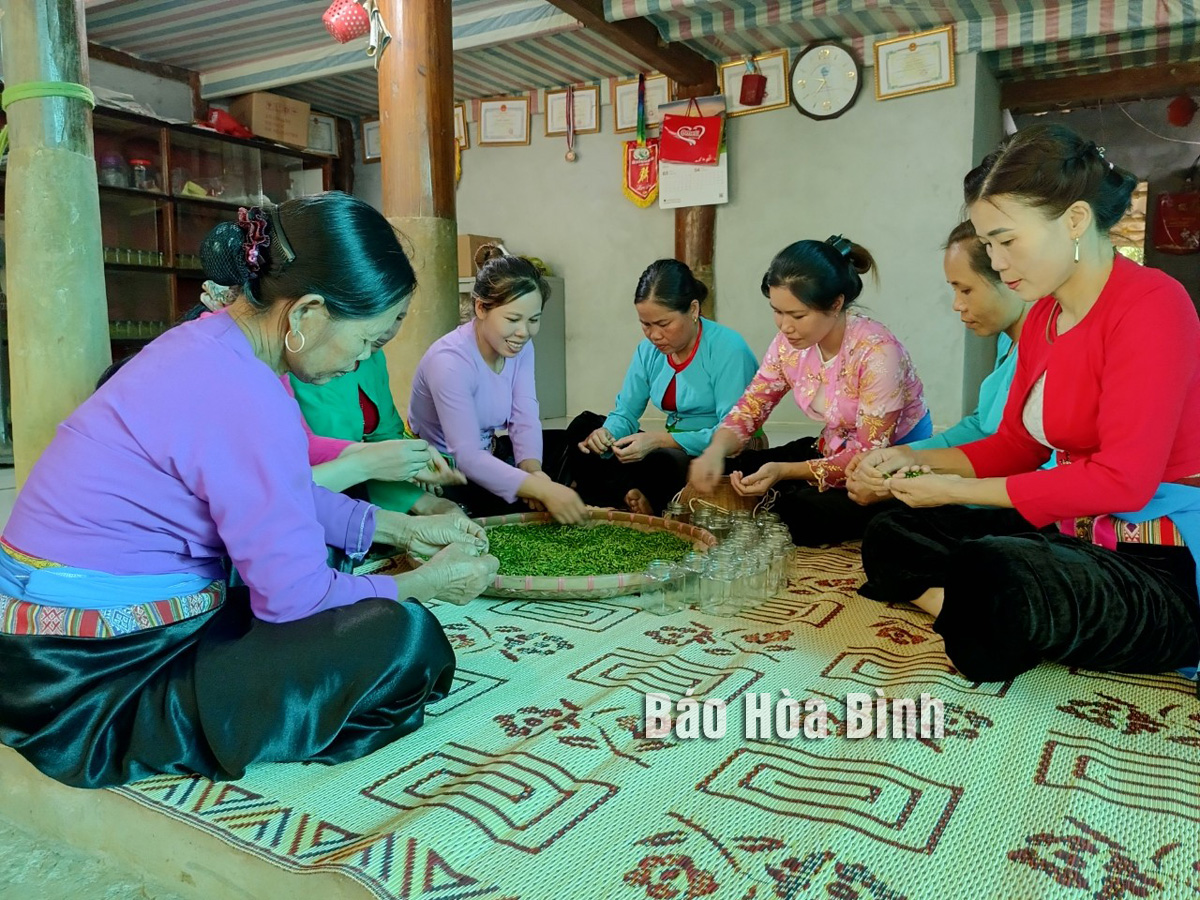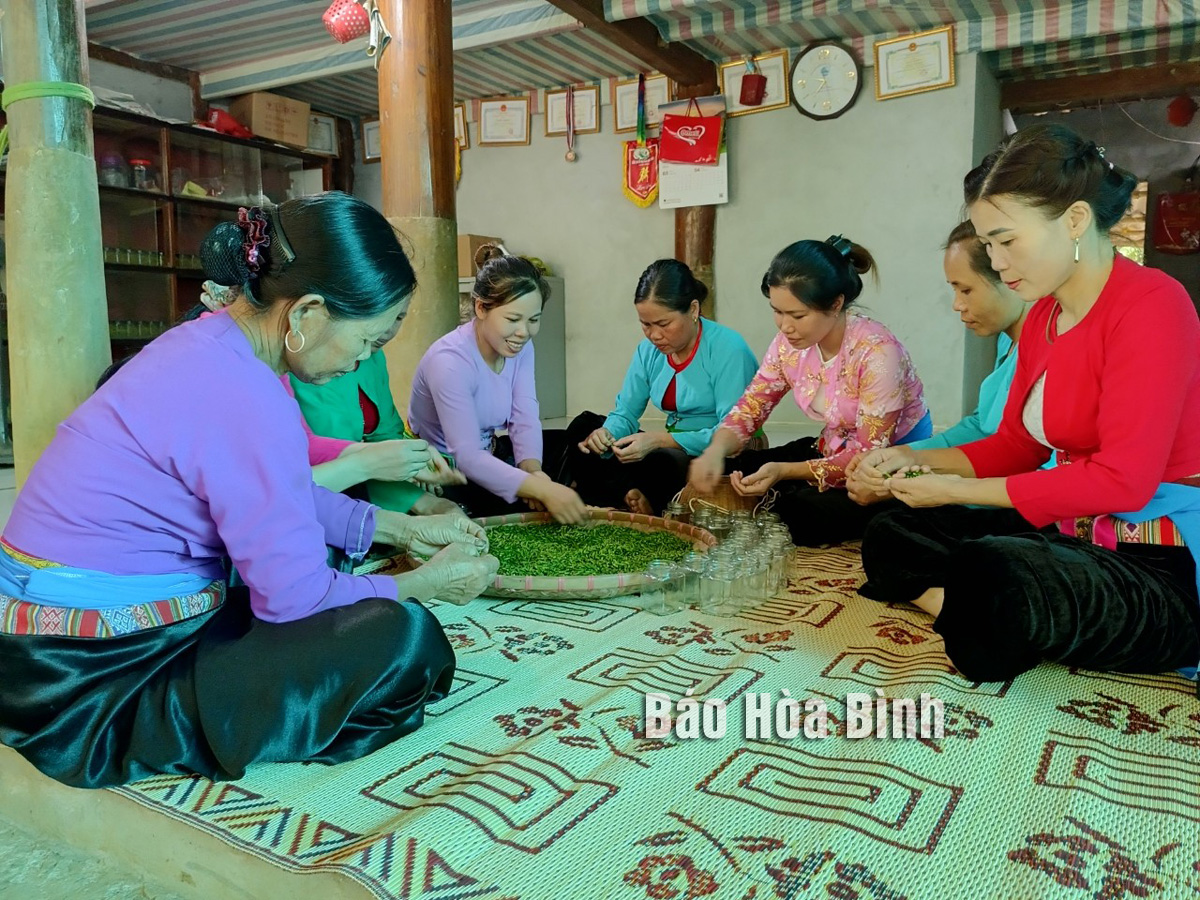
The success of the Phu Luong wild chili cultivation model in Quyet Thang commune, Lac Son district, not only demonstrates the economic potential of this plant but also affirms the entrepreneurial spirit and innovation of ethnic minority women.

Members of Phu Luong Wild Chili cooperative group in Quyet Thang
Commune, Lac Son district, process and package products.
Bui Thi Ha, head of the Phu
Luong Wild Chili cooperative group, said that chili plants have long been
associated with the lives of local residents.
"With the unique soil and
climate, wild chili plants here have a distinct aroma and spicy taste, becoming
an indispensable spice in every daily meal of people in Phu Luong region,” she
noted.
The cooperative group was set
up in 2018 with 15 members and a cultivation area of 3,000 sq.m, Ha recalled. The area for chili farming
has increased to more than 1ha with an output of 1.5-2 tonnes of chili. Each
member of the cooperative group earns an income of 5 - 6 million VND (202-242
USD) per month on average.
After joining the group,
members have chance to participate in training programmes and receive support
in terms of funding and techniques to improve product quality and explore
stable markets. As a result, many women escape poverty and improve their lives.
Notably, the initiative of
cultivating wild chili with biological method won an award in the Women’s
Startup Competition organised by the Vietnam Women’s Union with a pool prize of
157 million VND. With this funding, the cooperative group continued to invest
in improving product quality and packaging, bringing the best products to
consumers.
With the support of the
district Women's Union, Phu Luong wild chili has registered a trademark with
barcodes, allowing consumers to search its traceability. As a result, it has
become popular in the market. In addition to cultivating and harvesting fresh
chili, cooperative group members also produce pickled chili peppers.
Previously, pickled chili peppers were stored in plastic bottles, which quickly
became moldy and couldn’t be preserved for long. Now, Phu Luong pickled chili
is packaged in glass jars, which doesn’t only meets food safety and can be
preserved for up to 24 months.
Bui Thi Ngoi, chairwoman of
the district Women’s Union, said that with its delicious flavour, Phu Luong
wild chili is being favoured by consumers. Currently, the product is not only
popular in Hoa Binh but also distributed in several provinces and cities such
as Hanoi and Hai Duong. Many Muong ethnic women in the area have earned stable
incomes and improved their quality of life thanks to this model.
According to data from the Hoa Binh Provincial Party Committee, the industrial production index for the first six months of 2025 is estimated to have increased by 20% compared to the same period last year. This marks the highest year-on-year growth rate for this period since 2020.
In the first six months of 2025, Hoa Binh province’s export turnover was estimated at 1.145 billion USD, marking an 18.11% increase compared to the same period in 2024. Import turnover was estimated at $ 804 million, a 17.15% increase, which helped the province maintain a positive trade balance.
The lives of the ethnic minority farmers in Tan Lac district have gradually improved thanks to the new directions in agricultural production. This is a testament to the collective strength fostered through the professional associations and groups implemented by various levels of the district’s Farmers’ Union.
With the motto the "product quality comes first,” after nearly one year of establishment and operation, Muong village’s Clean Food Agricultural and Commercial Cooperative, located in Cau Hamlet, Hung Son Commune (Kim Boi district), has launched reputable, high-quality agricultural products to the market that are well-received by consumers. The products such as Muong village’s pork sausage, salt-cured chicken, and salt-cured pork hocks have gradually carved out a place in the market and they are on the path to obtaining the OCOP certification.
In the past, the phrase "bumper harvest, rock-bottom prices" was a familiar refrain for Vietnamese farmers engaged in fragmented, small-scale agriculture. But today, a new spirit is emerging across rural areas of Hoa Binh province - one of collaboration, organisation, and collective economic models that provide a stable foundation for production.
Maintaining growing area codes and packing facility codes in accordance with regulations is a mandatory requirement for agricultural products to be eligible for export. Recently, the Department of Agriculture and Environment of Hoa Binh province has intensified technical supervision of designated farming areas and packing facilities to safeguard the "green passport" that enables its products to access international markets.



